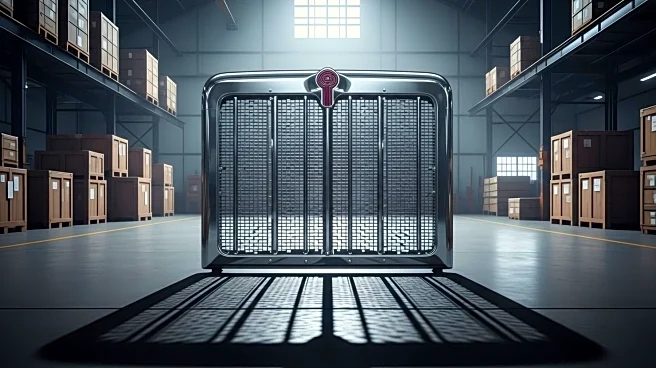What is the story about?
What's Happening?
The U.S. trucking industry, responsible for hauling approximately 11 billion tons annually and handling nearly three-quarters of the nation's freight by weight, is experiencing significant challenges. A retention crisis among truck drivers, coupled with stagnant wages, has led to increased bankruptcies, with over 30 trucking companies filing for Chapter 11 since the second quarter of 2023. Experts attribute these difficulties to a combination of labor shortages, declining demand, and broader economic headwinds. The industry is also grappling with the impact of tariffs on medium and heavy-duty trucks, which are set to take effect in November, potentially increasing production costs for domestic manufacturers.
Why It's Important?
The trucking industry is vital to the U.S. economy, providing essential services that support economic growth and mobility. The current challenges, including driver shortages and tariffs, could lead to increased costs for consumers and businesses, affecting supply chains and economic stability. The introduction of tariffs may benefit U.S. producers in the long run, but the immediate impact could be higher prices due to increased production costs. Additionally, automation and artificial intelligence pose potential disruptions, with nearly half of truck drivers at risk of being replaced within a decade. These developments could reshape the industry, affecting employment and economic dynamics.
What's Next?
The trucking industry may face further disruptions as tariffs take effect and automation technologies advance. Companies will need to adapt to changing economic conditions and explore efficiency-enhancing technologies to remain competitive. The industry must also address labor retention issues to ensure operational capacity and meet demand. Stakeholders, including policymakers and industry leaders, will likely continue to debate the impact of tariffs and automation on the industry, seeking solutions to mitigate negative consequences and capitalize on potential benefits.
Beyond the Headlines
The challenges facing the trucking industry highlight broader economic and policy issues, including trade policy impacts and labor market dynamics. The potential for automation to replace a significant portion of the workforce raises ethical and social considerations, such as the need for retraining programs and support for displaced workers. The industry's evolution may also influence environmental policies, as efficiency improvements and technological advancements could reduce emissions and enhance sustainability.















